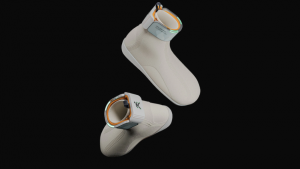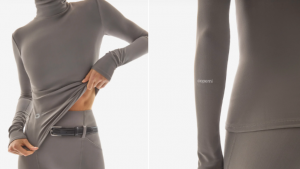Conference goers at Design Indaba 2018 were left inspired by young Egyptian designer Amna Elshandaweely as she took them on a creative journey, unpacking the intersections of fashion and identity.
Her work fiercely takes on topics that others in the fashion industry might choose to ignore. From discrimination to gender equality or political issues, Elshandaweely is not one to shy away from anything.
Although confident on stage, there’s a vulnerability to Elshandaweely’s presence that makes people sit up and listen. She’s in conflict, she explains, with the status quo in Cairo.
“Why can’t we export our own fashion that stems from our own culture, our own experience, our struggles,” she adds.
For Design Indaba, instead of delivering a standard keynote, Elshandaweely launched a new range called Cairo Punk in an electrifying fashion show.
The show featured diverse models walking across the stage to the sound of pounding Egyptian beats as a graffiti artist created a piece of work on the wall behind them. Inspired by Afropunk, Elshandaweely’s latest range reflects Cairo’s streetwear culture, an underrepresented aspect of life in the city.
This range comes after collections like Road to Fayoum, a range inspired by a city in Cairo. In it, she focussed on diverse models and personalities, challenging the notion that lighter skin equates beauty.
In another collection, Road to Nairobi, she questioned race and identity, and in The City of Amazigh, she shed light on the oppression of women in Siwa.
The City of the Amazigh featured bold colours and elaborate textiles. She decided to photograph the campaign in front of the Amazigh women as a way of showing them that it’s okay to be something more.
“I wanted women to see a powerful image of strong women just standing there.”
More on fashion and social impact:
Malian textile designer Aboubakar Fofana on the hypocrisy of the fashion industry
Meet the future of South African fashion
Not African Enough explores the diversity of Kenya's fashion landscape








